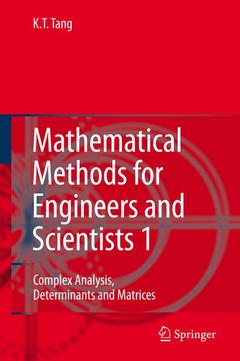Mathematical Methods for Engineers and Scientists 1, 2007 Complex Analysis, Determinants and Matrices
Auteur : Tang Kwong-Tin

The topics of this set of student-oriented books are presented in a discursive style that is readable and easy to follow. Numerous clearly stated, completely worked out examples together with carefully selected problem sets with answers are used to enhance students' understanding and manipulative skill. The goal is to help students feel comfortable and confident in using advanced mathematical tools in junior, senior, and beginning graduate courses.
K.T. Tang received his B.S. in Engineering Physics and M.A. in Mathematics from University of Washington and his Ph.D. in Physics from Columbia University. He did postdoctoral studies in Chemistry at Berkeley and Harvard. He worked as an engineer at Collins Radio Company and Boeing Company. Dr. Tang regards teaching as his calling, although his research accomplishments are also considerable. He authored/co-authored over 130 research papers in professional journals and a monograph "Asymptotic Methods in Quantum Mechanics". He lectured widely in Asia, Europe, and North America. He had been a long-term visiting scientist at Max-Planck-Institut in Göttingen. He is a recipient of a Distinguished U.S. Senior Scientist Award from Alexander von Humboldt Foundation and a Faculty Excellence Award from Pacific Lutheran University where he is Professor of Physics.
A discursive style that is readable and easy to follow yet without slighting relevant mathematics
Mathematics are presented in physical and/or historical contexts without stifling formal language
Numerous clearly stated, completely worked out examples
Carefully selected problem sets with answers to help developing students' manipulative skill and confidence without frustrating and overwhelming them
Well organized subjects and detailed table of contents to give students an overview of what they are learning
Self-contained chapters so that topics can be selectively studied
References to computer algebraic systems for symbolic manipulations, to computer program packages for large scale numerical calculations
Includes supplementary material: sn.pub/extras
Date de parution : 11-2006
Ouvrage de 319 p.
15.5x23.5 cm



